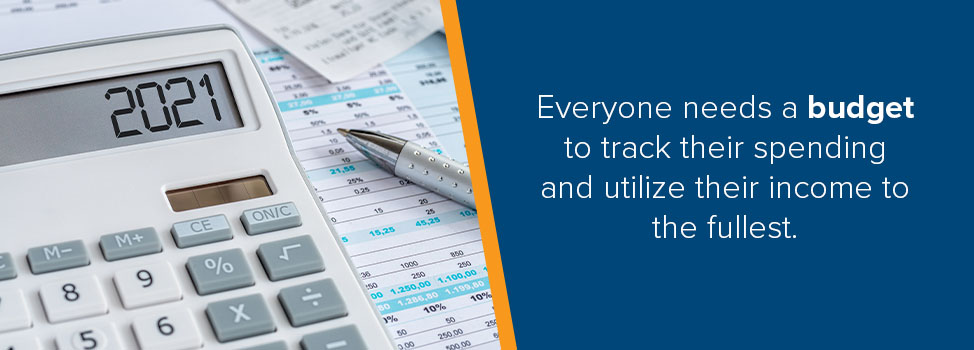Managing Expenses While Working From Home

The United States is navigating new territory regarding what the average workday can look like. Companies used to make their employees come into work every day, clock in their hours and complete their work under some level of supervision. Today, more companies are letting their employees work from home, changing the way they approach their tasks and their personal budgets.
Stanford University economist Nicholas Bloom, who has been studying and documenting work-from-home trends for several years, observed in 2020 that 42% of the United States labor force was working from home full time. “The stigma associated with working from home prior to COVID-19 has disappeared,” Bloom says. “Working remotely is now extremely common…and a number of corporations are developing plans for more work-from-home options beyond the pandemic.”
Bloom’s findings mean that more people will likely keep working from home for the foreseeable future. If you are among the many Americans working from home, read on for information to help manage your work-from-home expenses.
How Working From Home Affects Your Budget
Working from home can affect your budget in both positive in negative ways. Though everyone’s budget is different, there are a few core expenses you may be able to spend less money on when working from home:
- Child care: You may be able to complete your work while taking care of your children, allowing you to reduce or cut your child care costs completely. Any child care you do need could be more affordable since you may be able to handle some of the tasks yourself or need help for a shorter amount of time.
- Commute and vehicle expenses: Your commute can be one of the most expensive parts of your budget depending on how far away you live from work. Working from home lets you skip the commute and avoid unnecessary wear and tear on your vehicle, saving you money on gasoline and vehicle repairs.
- Food and coffee: It’s easy to overload your budget paying for morning coffees and takeout lunches when you travel for work. Working from home gives you the chance to save money by making your own coffee and preparing your lunches.
- Clothing costs: Feeling confident in your appearance is important when working around other people in a professional setting. You may feel less pressure to buy new outfits when working from home. Realistically, most online video meetings only display your torso and up.
You can save money working from home, but some expenses will increase. Here are some of the areas that could cost you more:
- Home office furnishings: You need an adequate workspace when working from home. This can include a comfortable chair, an ergonomic desk and office supplies to work efficiently. These home office expenses can add up, but they can make a significant difference in your comfort and productivity while working from home.
- Internet: Bloom states, “Many Americans lack the facilities or sufficient internet capacity to work effectively from home.” Data transfer speeds remain a challenge for workers transitioning to their at-home office. To keep up with your company’s demands, you may need to spend more money on an upgraded internet package.
- Utilities: Spending more time at home means accruing higher utility costs. These include expenses like heating, air conditioning, electricity and water. You’ll be using these utilities more than you used to, so you can expect their costs to be higher.
- Hidden expenses: You may discover some hidden expenses when you work from home, like paper products, longer shopping lists and home repairs.

Reworking Your Budget and Managing New Expenses
Everyone needs a budget to track their spending and utilize their income to the fullest. Since your expenses change when you start working from home, you’ll need to adjust your budget to reflect those changes. Here are some tips to help you as you begin managing your work-from-home expenses:
- Check your current financial liabilities: Write a list of all your monthly expenses. Consider consistent costs like food, mortgage, gas, utilities, insurances, subscription services and recurring bills. Determine how much you pay for each of these areas and add each expense to calculate your total monthly expenses. Strive to have this money in your bank account ahead of time so you can pay your bills each month.
- Use a credit card for expenses: A good way to track your monthly expenses is to put them on a credit card. Your monthly credit card statement accurately reflects how much you spend. Make sure to stay within your set amount for monthly expenses and pay off your card each month to avoid paying more than you intended.
- Set a limit for expenses you can control: Whether you’re going grocery shopping, eating out with friends or giving yourself a gift on payday, set a spending limit to make sure you stay within your budget. This could seem like a restriction, but you can enjoy the financial freedom of knowing you’re following your budget while enjoying the fruits of your labor.
- Save: Save money every month to make progress toward your financial goals. Your savings account can be for a large purchase you want to make, or it can be an emergency fund so you’re ready for whatever life throws at you. What matters is that you save, even if it’s only a little at a time.
What About Home Office Tax Deductions?
Many people enjoy working from home because of the supposed tax deductions they can enjoy as a result. The truth is that these deductions are quite strict and only apply to specific work-from-home circumstances. If you are an official employee of a company, you’re unable to receive these tax deductions for working from home. Some employers will pay for part of these new work-from-home expenses, but the Internal Revenue Service (IRS) only offers their special tax deductions to self-employed individuals.
If you’re a private contractor, freelance worker or business owner, you may qualify for special tax deductions like the following:
- Home office: You can deduct money from your taxes based on the size of your dedicated office space. You’re unable to take the deduction if you work in a shared area of your home or apartment. If you have an area of your living space you use strictly for work, you can figure a tax deduction for it based on its square footage.
- Business mileage: You can reduce your taxable income by subtracting the money you pay for business-related travel. Be sure to track your mileage and all travel expenses to enjoy the greatest benefit from this deduction.
- Business or office expenses: The IRS allows you to deduct various office expenses like office supplies and upgrades. Those expenses could be significant upfront, but the good news is that you’ll owe less during tax season because of them.
Mid Penn Bank Is Here to Help as You Work From Home
When you need a bank with which to manage and save your work-from-home expenses, Mid Penn Bank is a trusted choice. We commit ourselves every day to serving our local community and have done so since 1868. We take great pride in serving the communities of Central Pennsylvania and look forward to growing with you. As you begin or continue working from home, we want to be there to help you find financial success every step of the way.
Contact us today with any questions or for more information on how to gain control of your finances.
Share:
Disclosures
The material on this site was created for educational purposes. It is not intended to be and should not be treated as legal, tax, investment, accounting, or other professional advice.
Securities and Insurance Products:
NOT A DEPOSIT | NOT FDIC INSURED | NOT BANK GUARANTEED | NOT INSURED BY ANY FEDERAL GOVERNMENT AGENCY | MAY LOSE VALUE

